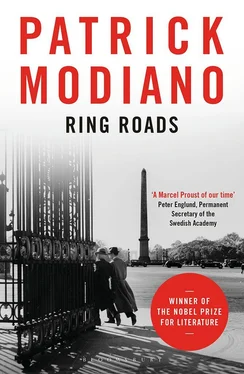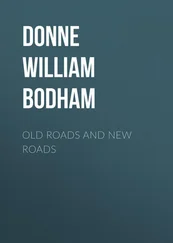Patrick Modiano - Ring Roads
Здесь есть возможность читать онлайн «Patrick Modiano - Ring Roads» весь текст электронной книги совершенно бесплатно (целиком полную версию без сокращений). В некоторых случаях можно слушать аудио, скачать через торрент в формате fb2 и присутствует краткое содержание. Год выпуска: 2015, Издательство: Bloomsbury Paperbacks, Жанр: Современная проза, на английском языке. Описание произведения, (предисловие) а так же отзывы посетителей доступны на портале библиотеки ЛибКат.
- Название:Ring Roads
- Автор:
- Издательство:Bloomsbury Paperbacks
- Жанр:
- Год:2015
- ISBN:нет данных
- Рейтинг книги:3 / 5. Голосов: 1
-
Избранное:Добавить в избранное
- Отзывы:
-
Ваша оценка:
- 60
- 1
- 2
- 3
- 4
- 5
Ring Roads: краткое содержание, описание и аннотация
Предлагаем к чтению аннотацию, описание, краткое содержание или предисловие (зависит от того, что написал сам автор книги «Ring Roads»). Если вы не нашли необходимую информацию о книге — напишите в комментариях, мы постараемся отыскать её.
The Night Watch
Ring Roads — читать онлайн бесплатно полную книгу (весь текст) целиком
Ниже представлен текст книги, разбитый по страницам. Система сохранения места последней прочитанной страницы, позволяет с удобством читать онлайн бесплатно книгу «Ring Roads», без необходимости каждый раз заново искать на чём Вы остановились. Поставьте закладку, и сможете в любой момент перейти на страницу, на которой закончили чтение.
Интервал:
Закладка:
Now, we are sitting facing each other, and you are pouring me a cup of tea.
‘Earl Grey,’ you whisper.
We look very strange in our overcoats. Mine is a sort of camel-hair caftan, much too big. On the lapel of yours, I notice the rosette of the Légion d’honneur . It must have belonged to the owner of the house.
‘Perhaps you’d like some biscuits? I think there are some left.’
You open one of the dresser drawers.
‘Here, have one of these. .’
Cream wafers called ‘Ploum-Plouvier’. You used to love these sickly pastries and we would buy them regularly at a baker’s on the Rue Vivienne. Nothing has really changed. Remember. We used to spend long evenings together in places just as bleak as this. The ‘living-room’ of 64 Avenue Félix-Faure with its cherry-wood furniture. .
‘A little more tea?’
‘I’d love some.’
‘I’m so sorry, I haven’t got any lemon. Another Ploum?’
It’s a pity that, wrapped in our enormous overcoats, we insist on making polite conversation. We have so much to say to each other! What have you been doing, ‘papa’, these last ten years? Life hasn’t been easy, for me, you know. I went on forging dedications for a little longer. Until the day the customer to whom I offered a love letter from Abel Bonnard to Henry Bordeaux realised it was a fake and tried to have me dragged off to court. Naturally I thought it better to disappear. A job as a monitor in a school in Sarthe. Greyness. The pettiness of colleagues. The classes of stubborn, sneering adolescents. The night wandering around of the bars with the gym teacher, who tried to convert me to Hebert’s ‘natural method’ of physical education and told me about the Olympic Games in Berlin. .
What about you? Did you carry on sending parcels to French and foreign collectors? More than once, I wanted to write to you from my provincial bolt hole. But where would I write?
We look like a couple of burglars. I can imagine the surprise of the owners if they saw us drinking tea in their living room. I ask:
‘Did you buy the house?’
‘It was. . deserted. . ’ you look sideways at me. ‘The owners chose to leave because of. . recent events.’
I thought so. They’re waiting in Switzerland or Portugal until the situation improves, and, when they come back, we will, alas, no longer be there to greet them. Things will look just as usual. Will they notice we have been there? Unlikely. We are as careful as rats. A few crumbs perhaps, a dirty cup. . You open the cocktail cabinet, nervous, as though afraid of being caught.
‘A little glass of Poire Williams?’
Why not? Let’s make the most of it. Tonight this house is ours. I stare at the rosette on your lapel but I have no need to feel jealous: I too have a little pink and gold ribbon pinned to the lapel of my coat, no doubt some military decoration. We ’ll talk about reassuring things, shall we? About the garden that needs weeding and this beautiful bronze by Barbedienne gleaming in the lamplight. You are a forestry manager and I, your son, a regular officer in the army. I spend my furloughs in our dear old home. I recognise the familiar smells. My room hasn’t changed. At the back of the cupboard, my crystal radio, lead soldiers and Meccano, just as they used to be. Maman and Geneviève have gone to bed. We men remain in the living room, I love these moments. We sip our pear liqueur. Afterwards, our gestures mirroring each other, we fill our pipes. We are very alike, papa. Two peasants, two headstrong Bretons, as you would say. The curtains are drawn, the fire crackles cosily. Let’s chat, my old partner in crime.
‘Have you known Murraille and Marcheret long?’
‘Since last year.’
‘And you get along well with them?’
You pretended not to understand. You gave a little cough. I tried again.
‘In my opinion, you shouldn’t trust these people.’
You remained pokerfaced, your eyes screwed up. Perhaps you thought I was an agent provocateur. I shifted closer to you.
‘Forgive my interfering in something that doesn’t concern me, but I get the impression that they intend to harm you.’
‘So do I,’ you replied.
I think you suddenly felt you could trust me. Did you recognize me? You refilled our glasses.
‘Perhaps we should drink a toast,’ I said.
‘Good idea!’
‘Your health, Monsieur le Baron!’
‘And yours, Monsieur. . Alexandre! These are difficult times we’re living in, Monsieur Alexandre.’
You repeated this sentence two or three times, as a kind of preamble, and then explained your situation to me. I could hardly hear you, as though you were talking to me on the telephone. A tinny voice, muffled by time and distance. From time to time, I caught a few words: ‘Leaving. .’ ‘Crossing borders. .’ ‘Gold and hard currency. .’ And from them managed to piece together your story. Murraille, knowing your talents as a broker, had put you in charge of the self-styled ‘Societé Française d’achats’, whose mission was to stockpile a vast range of goods for resale later at a high price. He took three-quarters of the profits. To begin with, all went well, you were happy sitting in your large office on the Rue Lord-Byron, but recently, Murraille realised he no longer needed your services and considered you an embarrassment. Nothing could be easier, these days, than to get rid of someone like you. Stateless, with no social status, no fixed address, you had every disadvantage. It was enough to alert the ever-zealous inspecteurs of the Brigades spéciales . . You had no one to turn to. . except a night-club doorman by the name of ‘Titiko’. He was willing to introduce you to one of his ‘contacts’ who could get you across the Belgian border. The meeting was to take place three days from now. The only assets you would take with you were 1,500 dollars in cash, a pink diamond and some thin sheets of gold cut to resemble visiting cards that would be easy to disguise.
I feel as though I’m writing a ‘trashy adventure story’, but I’m not making this up. No, this is not a fiction. . There must surely be evidence, someone who knew you back then and who could corroborate these things. It doesn’t matter. I am with you and I will stay here until the end of the book. You kept glancing nervously towards the door.
‘Don’t worry,’ I said. ‘They won’t come.’
You relaxed a little. I tell you again that I’ll stay with you until the end of this book, the last one dealing with my other life. Don’t think I’m writing it out of pleasure; I had no choice.
‘It’s funny, Monsieur Alexandre, finding ourselves together in this room.’
The clock struck twelve times. A hulking object on the mantelpiece, with a bronze deer supporting the clock face.
‘The owner must have liked clocks. There’s one, on the first floor that chimes like Big Ben.’
And you burst out laughing. I was used to these outbursts of hilarity. Back when we were living on the Square Villaret-de-Joyeuse and everything was going badly, I would hear you at night, laughing in the next room. Or you would come home with a bundle of dusty share certificates under your arm. You would drop them and say in a lifeless voice: ‘I’ll never be quoted on the Stock Exchange.’ You would stand, staring at your loot, scattered over the floor. And suddenly it would overwhelm you. A laugh that grew louder and louder until your shoulders shook. You couldn’t stop.
‘And you, Monsieur Alexandre, what do you do in life?’
What should I say? My life? As storm-tossed as yours, ‘papa’. Eighteen months in Sarthe, as a school monitor, as I mentioned. School monitor again, in Rennes, Limoges and Clermont-Ferrand. I choose religious institutions. They afford more shelter. This domestic existence brings me inner peace. One of my colleagues, obsessed with Scouting, has just started up a troop for young people in the Forest of Seillon. He was looking for scout leaders and took me on. Here I am in my navyblue plus fours and brown gaiters. We get up at six. Our days are divided between physical education and manual work. Communal sing-songs in the evening, round the campfire. A quaint idyll: Montcalm, Bayard, Lamoricière, ‘Adieu, belle Françoise’, planes, chisels and the scouting spirit. I stayed three years. A safe bolt-hole, just the place to be forgotten. Sadly, my baser instincts regained the upper hand. I fled this haven and found myself at the Gare de l’Est, without even taking the time to remove my beret and badges.
Читать дальшеИнтервал:
Закладка:
Похожие книги на «Ring Roads»
Представляем Вашему вниманию похожие книги на «Ring Roads» списком для выбора. Мы отобрали схожую по названию и смыслу литературу в надежде предоставить читателям больше вариантов отыскать новые, интересные, ещё непрочитанные произведения.
Обсуждение, отзывы о книге «Ring Roads» и просто собственные мнения читателей. Оставьте ваши комментарии, напишите, что Вы думаете о произведении, его смысле или главных героях. Укажите что конкретно понравилось, а что нет, и почему Вы так считаете.












